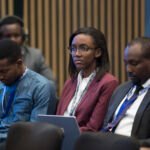With Nigeria now certified polio-free by the World Health Organisation (WHO), the Nigerian National Polio-plus Committee of Rotary International has disclosed the total sum spent to achieve this feat.
Development Diaries reports that the Africa Region Certification Commission had on 25 August certified the 47-member WHO Africa Region as wild polio-free after going four years without a recorded case.
Speaking with reporters on this development, Chairman of the Rotary committee, Dr Tunji Funsho, said that the organisation had spent $2.2 billion to eradicate wild poliovirus from Africa’s most populous nation.
Funsho said, ‘I, the National Polio-plus Committee, and all the Rotarians in Nigeria who have been working in tandem feel a deep sense of accomplishment and relief.
‘At the same time, we must remind ourselves that we have not reached the bus stop in our wild poliovirus eradication.
‘We are looking forward to a time when we can say that the job is done and no child is paralysed by the wild poliovirus.
‘When we are talking about funding, we have surpassed our deadline of the year 2000.
‘We have gone another 20 years and that has its attendant costs which have increased the cost of this effort to almost $19bn and still counting because we have not eradicated polio from the world.
‘Rotary has spent at least $2.2bn out of the $17bn on polio eradication worldwide.
‘In Nigeria alone, in the last 15 years, we have expended about $298 million on the programme and we expect that we will still need some funds’.
In the course of kicking polio out of Nigeria, it was gathered that the Boko Haram activities in the country’s northeast adversely affected immunisation for about two years.
‘The insurgency in the North, in Borno State in particular, prevented us from reaching children below the age of five for about two years’, Funsho said.
‘It was not too surprising that when those areas were liberated, we found children with the virus; they had been living in areas where the people had wild poliovirus and had been circulating.
‘By the time we got them out of the IDP camps, we picked four cases that have had the wild poliovirus.
‘Thankfully, Rotary and the partnership rose to the occasion and the President magnanimously released without hesitation over N9.5 billion to contain that outbreak in Borno state. It yielded very positive results because those were the last four cases we have seen since 2016’.
With the declaration of Africa as wild polio-free, five of the six WHO regions are now free of the virus.
‘Ending wild polio virus in Africa is one of the greatest public health achievements of our time and provides powerful inspiration for all of us to finish the job of eradicating polio globally’, the WHO Director-General, Dr Tedros Adhanom Ghebreyesus, had said on 25 August.
Polio, or poliomyelitis, is a disabling and life-threatening disease caused by the poliovirus. It spreads from person to person and can infect a person’s spinal cord, causing paralysis.
Source: THISDAY
Photo source: UNICEF Ethiopia







